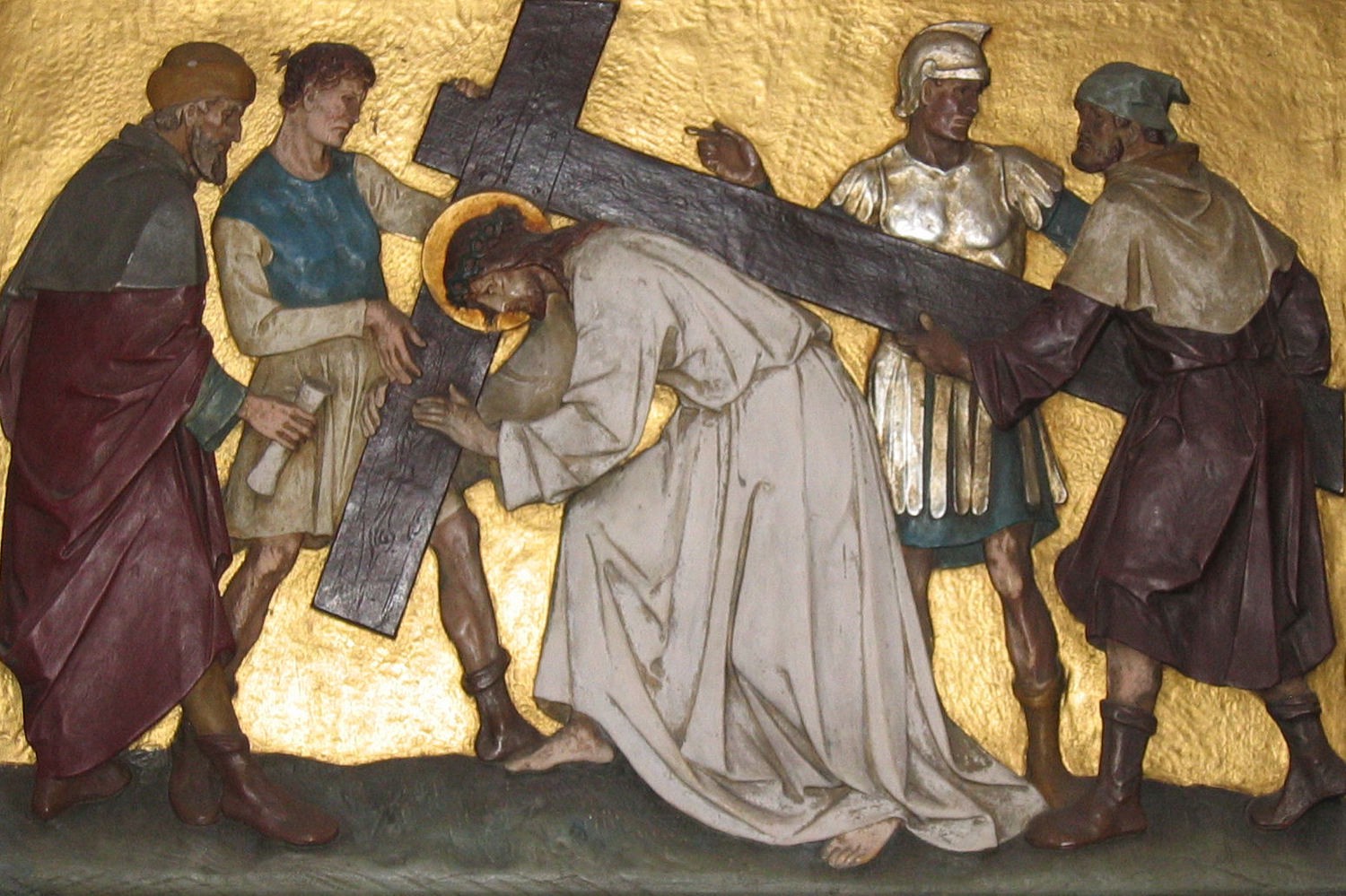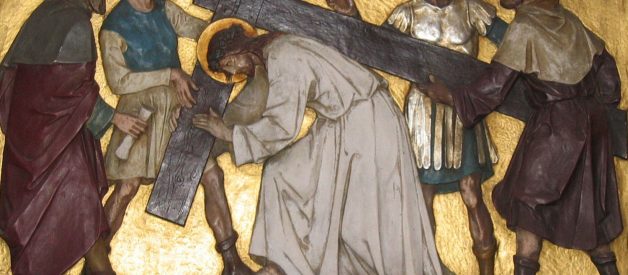
Last week, I found myself wandering around the Santa Barbara Mission ? that historic Spanish building built by 18th century Franciscans and Native Americans ? when I had a bit of a flashback. The old church there features small oil paintings for the Stations of the Cross, the step-by-step ancient retelling of the crucifixion narrative. All fourteen stations are painted to tell the ?Passion? in a semi-circle around the perimeter of the sanctuary.
As with most of my visits to old Catholic buildings, the sensory religious experience of my childhood came flooding back to me: countless masses, liturgies, and plays throughout the many Lenten seasons all filled my mind in the first station, the second station, and so on?until my attention was stopped on the fifth station ? the one that always captivated my attention as a child: ?Simon helps Jesus carry the cross.?
This idea, that a bystander named Simon would be called over to help Jesus carry the cross ? and that he would do it ? always arrested me. Later, upon embracing my Bible-reading Protestantism, I actually read the passages of Scripture upon which the fifth station was based. Three out of the four gospels reported the story of Simon of Cyrene, and mention by name the man who helped carry the cross:
As they went out, they found a man of Cyrene, Simon by name. They compelled this man to carry his cross. ? Matthew 27:32
And they compelled a passerby, Simon of Cyrene, who was coming in from the country, the father of Alexander and Rufus, to carry his cross. ? Mark 15:21
And as they led him away, they seized one Simon of Cyrene, who was coming in from the country, and laid on him the cross, to carry it behind Jesus. ? Luke 23:26
Each of these Scriptural reports tell us something different about this man, Simon of Cyrene, and in turn, tell us something important about our life with Jesus.
First, it is not to be overlooked that Simon carried Jesus? cross. Matthew and Mark clearly state the object Simon carried: ?his [Jesus?] cross.? This might sound obvious, but it is profound that this man, Jesus, who all the gospel writers clearly understand to be God incarnate, needs assistance at his moment of suffering. Is God not the one who bears the suffering for us? Why, then, does he need the assistance of what seems to be a random man?
Simon carrying Jesus? cross is our reminder of the humility of God. This is an attribute God does not need, nor is it an attribute ever expected of him. We probably more cleanly align with those who would shout at Jesus to come off the cross, or tell him to send a legion of angels to rescue himself, and mockingly place signs above him as to shame him towards a power we want him to display. To us, it would make sense for God to flex his omnipotent muscles during his moments of agony.
And yet he does not. This withholding is the very nature of Jesus, who, ?though he was in the form of God, did not count equality with God a thing to be grasped, but emptied himself, by taking the form of a servant, being born in the likeness of men? (Philippians 2:6?7). Shockingly, Jesus allowed a man he created to help him carry the cross. The strange, discomforting, beautiful, mysterious, and scandalous thing about God is that he often chooses not to act like it. What kind of God accepts the help of his own creation?
The second remarkable thing about Simon of Cyrene, is that he is named. The gospel of Mark gives us the longest introduction to who he is: ?a passerby, Simon of Cyrene, who was coming in from the country, the father of Alexander and Rufus?? (Mark 15:21).
The significance of Mark naming anyone, let alone this man who assisted Jesus, is that it is a clear signal of the authority of the story. At the time of the circulation of Mark?s gospel (near 65 AD), Simon of Cyrene ? and even more certainly, his children, who are also named ? could have been tracked down to corroborate this event. One can imagine someone hearing this and seeking out Simon or his children Rufus and Alexander to ask, ?Did this really happen? Was Jesus really who he said he was?? Mark is certain of their answer. These are the eyewitnesses (1 Corinthians 15:6, 1 John 1:2, 2 Peter 1:16). It is suggested by many scholars that the ?Rufus? mentioned and thanked by St. Paul in Romans 16:13 is Simon?s son.
But it is also important that Simon is named here because, oddly, there are just not many names in the Bible. As we read the Bible, most anytime anyone is given a name with a location and a short genealogy, our eyes should focus in. How many ?passerbyers? go unnamed in the New Testament? How many scores of families, crowds, and even those who were healed from illnesses go without any proper name attribution? Countless.
When the New Testament authors give someone a name, it shows us their significance in the story, and for one verse and one short moment, it appears Simon of Cyrene is honored in that he is remembered. Billions upon billions of human beings have lived and died since this time, and we know Simon for what he did on Good Friday. Perhaps this shows us what God himself remembers: small acts that serve those suffering.
Finally, it is significant that Simon carried the cross ?behind Jesus,? as Luke mentions in his account. Simon of Cyrene became, in some metaphorical and perhaps very real way, the first Christian.
Before his arrest and betrayal, Jesus said to his would-be followers, ?If anyone would come after me, let him deny himself and take up his cross daily and follow me? (Luke 9:23). To be a Christian is to live a ?cruciform life,? a kind of existence that is shaped by and through the cross. We bear the cross Jesus provides for us. This is precisely what Simon did and precisely what we must do too. As St. Paul wrote, we do this so that we may know Jesus ?and the power of his resurrection, and may share his sufferings, becoming like him in his death? (Philippians 3:10).
Simon of Cyrene, following behind Jesus with the cross, is the picture of discipleship. Christ has gone first. He has gone and is going to where we cannot. Still, we follow in his steps, bearing the cross behind him. This is why Christians today join in with the song based off of the words of the martyr Sadhu Sundar Singh:
?The cross before me,
the world behind me.
No turning back,
no turning back??


